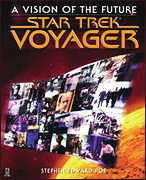CBS’s plans to designate their CBS All Access streaming service as the primary delivery source — in the United States — for the 2017 Star Trek television renaissance has been met with a wide range of reactions from fans since the November 2 announcement.
While some have cheerfully announced plans to open their wallets to the $5.99/month subscription fee when the show arrives next year, others have strongly demanded a change in venue for the upcoming series (not to mention those already boasting about their more questionable viewing plans, of which we will not be covering or encouraging here).
One of the most frequent comments we’ve seen are from those wondering why CBS didn’t just “put it on Netflix or Amazon!”, services to which many already subscribe. The answer, of course, should be no surprise; CBS wants to make their prized possession the cornerstone of their push into the streaming market on a service they control (and monetize) top-to-bottom.
Prominent television critic Alan Sepinwall of HitFix.com commented concisely on the reasoning behind the CBS All Access plan this past Friday, expressing a somewhat pragmatic view that CBS is simply the first of many high-demand television providers to move to divergent VOD sources.
Why does CBS think “Star Trek” should be streaming and not broadcast? The answer is simple: they need people to subscribe to CBS All Access and pay the $5.99 a month subscription fee for that.
Right now, having access to streaming versions of current CBS shows, and a certain library of CBS-owned shows (like the original “Star Trek” series, like “Taxi,” and a bunch of other things) is apparently not enticing enough – and they figure a new show is going to force people to subscribe in the same way people feel compelled to subscribe to Netflix for “House of Cards,” “Orange is the New Black,” or “Arrested Development.” [“Star Trek”] is the hook.
This is the future — everyone’s going to be doing one of these [streaming] services eventually, and CBS was the first of the broadcast networks to get out in front. The à la carte, cord-cutting world of the future is going to wind up costing you even more than you pay now for cable unless you’re willing to get a drastically reduced amount of programming in the bargain.
That’s not great, but you’re going to be seeing more deals like this in the future.
In addition, after years of fan-driven desire for a Netflix resurgence of a Star Trek television adventure, Variety’s Cynthia Littleton revealed in a new report today that competing interests from other video-on-demand streaming services actually gave CBS the confidence they needed to anchor the franchise’s return to their own online portal.
The progress of CBS All Access and its sibling Showtime broadband service were the dominant theme of questions that CBS chief Leslie Moonves fielded from Wall Streeters during the network’s third-quarter earnings call on Nov. 3. HBO Now was also a big focus for analysts during Time Warner’s Nov. 4 earnings call. The businesses are tiny now in the scheme of things for both congloms, but they are seen as important bellwethers for the future.
Insiders dispute the suggestion that subscriber uptake has been disappointing, especially as neither has yet to unleash a significant national marketing blitz.
Moonves noted that September was the strongest month yet for CBS All Access sign-ups since the service launched in October 2014. CBS chief operating officer Joe Ianniello said that CBS All Access and Showtime’s broadband channel (which bowed in July) would be contributors to the Eye’s projected operating income growth in 2016.
Original programming was part of the game plan for CBS All Access from the start. “Star Trek” was a natural choice because the worldwide fan base for the enduring franchise virtually assures strong international sales.
What’s more, CBS has been approached by more than one SVOD rival interested in reviving a “Star Trek” series. That told network execs it was a no-brainer to steer the show to CBS All Access, which is also home to the previous five “Trek” TV series, starting with the original 1966-69 edition.
That about sums it up: clamoring for an on-demand Star Trek experience gave CBS the assurance to control the supply, and from a purely business perspective, it’s hard to argue with their logic — though adding another streaming subscription to an already divergent digital landscape is driving many to voice their displeasure with the decision.
Until there’s more information about exactly what this show will be, from the Star Trek universe in which it takes place, the cast assembled to crew the adventure, or the writing team putting it all together — none of which have been announced by CBS — we’re sure that many will be on the fence about committing to this online offering for a while, because while this may be good business, fans still want to know what they’ll be paying for.
![]()

 Star Trek: VoyagerA Vision of the Future
Star Trek: VoyagerA Vision of the Future Star Trek: VoyagerComplete Series on DVD
Star Trek: VoyagerComplete Series on DVD Star Trek: VoyagerA Celebration
Star Trek: VoyagerA Celebration